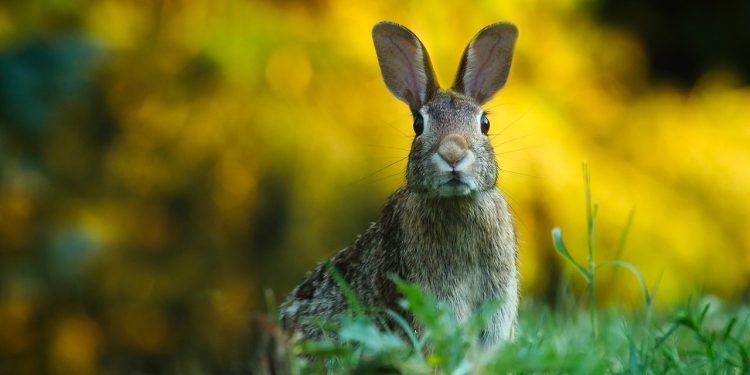When people think about intelligent animals, species like dolphins, chimpanzees, and dogs often come to mind. Rabbits, by contrast, rarely make it onto lists of brainy creatures. Known more for their adorable appearance and their role in popular culture as the quintessential prey animal, rabbits are often misunderstood when it comes to their cognitive abilities. But are these furry companions actually smarter than we give them credit for? Recent studies and anecdotal evidence suggest that rabbits have an impressive array of skills and behaviors that indicate a surprising level of intelligence. This article delves into the complex and captivating world of rabbit intelligence, exploring how smart these animals really are.
Problem-Solving Skills: More Than Just Fluff
One of the key indicators of intelligence in animals is their ability to solve problems, and rabbits are no exception. Contrary to popular belief, rabbits are capable of complex problem-solving behaviors. If you’ve ever seen a rabbit in a well-enriched environment, you’ve likely noticed them exploring their surroundings, finding ways to reach hidden treats, or even manipulating objects to achieve their goals. In the wild, rabbits need to navigate complex burrow systems, avoid predators, and find food, all of which require quick thinking and problem-solving capabilities.
In a domestic setting, this natural instinct to solve problems can be encouraged through the use of puzzles and interactive toys. Owners have found that rabbits enjoy figuring out how to open compartments or move objects to reach a hidden reward. They learn through trial and error, indicating that their ability to work through challenges is not solely based on instinct but on learning and memory as well. This cognitive flexibility is a sure sign that rabbits have a much deeper level of intelligence than they are often credited with.
Social Intelligence: The Dynamics of Rabbit Communities
Rabbits are inherently social animals, and their social intelligence is one of their most remarkable traits. In the wild, rabbits live in groups known as warrens, where they form complex social hierarchies. The ability to navigate these social structures requires a sophisticated understanding of other individuals’ behavior, as well as communication and cooperation. Rabbits establish relationships based on dominance and submission, and they are adept at interpreting each other’s body language, vocalizations, and even scents.
In a domestic environment, rabbits extend this social behavior to their human companions. Many owners are surprised to discover that their rabbits recognize them, react differently to various family members, and even respond to their names. A bonded rabbit will greet its favorite human with nudges or follow them around the house. These behaviors show that rabbits are capable of building strong relationships and recognizing individual personalities, which suggests a higher level of social cognition than they are often given credit for.
Memory and Learning: The Capacity to Adapt
Memory is a critical component of intelligence, and rabbits possess a surprisingly robust memory system. They can learn routines, remember routes around their environment, and even recall people or other animals they have met. For example, rabbits that are accustomed to a feeding schedule will often anticipate feeding times, waiting near their food dish or even performing certain behaviors to get their human’s attention. This kind of anticipatory behavior shows that rabbits are capable of forming associative memories—they link certain actions or times of day to specific outcomes.
Additionally, rabbits are quite capable of learning through positive reinforcement. Training a rabbit to use a litter box or respond to certain commands requires them to remember actions and connect them with rewards. This associative learning is akin to the training techniques used for dogs, and it proves that rabbits are not only trainable but also capable of understanding cause and effect. Some rabbit owners have even managed to teach their pets to perform tricks, like jumping through hoops or navigating obstacle courses, which further illustrates their capacity for learning and adaptability.
Communication: A Subtle Language
Communication is another area where rabbits demonstrate intelligence. Although they don’t vocalize as frequently as dogs or cats, rabbits have a rich repertoire of non-verbal communication that allows them to express a range of emotions and intentions. A rabbit thumping its hind legs, for example, is a clear sign of distress or a warning to others, while gentle nudges or “binkies”—those joyful leaps into the air—express happiness and comfort.
Rabbits also communicate with humans in subtle ways. They may nudge their owners to ask for attention or affection, or they might gently tug on clothing when they want a treat. Rabbits are also known to “flop” onto their sides when they feel completely relaxed and safe in their environment. These communicative behaviors show that rabbits are capable of expressing their needs and emotions, both to other rabbits and to their human caretakers, which is an important indicator of their social and emotional intelligence.
Emotional Sensitivity: The Empathic Side of Rabbits
While it might be surprising to some, rabbits are also quite sensitive to the emotions of those around them. They are capable of picking up on changes in their environment and can sense when their human companions are stressed, upset, or happy. A stressed rabbit may become more aloof or hide away, while a relaxed and happy rabbit will display more social behaviors like grooming and seeking attention.
This emotional sensitivity is likely a product of their evolutionary need to constantly gauge their surroundings for threats. As prey animals, rabbits need to be hyper-aware of changes in their environment, and this extends to social changes within their group. Domestic rabbits, having adapted to life with humans, often transfer this vigilance to their human relationships. This means they are perceptive to shifts in their owners’ behavior or routines, and they may respond accordingly, whether by seeking comfort or displaying more playful behaviors.
Comparing Rabbit Intelligence to Other Pets
So, how does rabbit intelligence stack up against other popular pets like cats and dogs? While rabbits may not have the same reputation as problem-solving geniuses like dogs, their intelligence is uniquely suited to their evolutionary needs. Unlike dogs, who have been bred to follow commands and work alongside humans, rabbits have retained much of their independent survival instinct. They are less likely to seek direct commands from humans, but they make up for it with their ability to adapt, learn routines, and solve problems in ways that are meaningful to them.
In comparison to cats, rabbits display similar levels of independence and curiosity. Both animals have strong personalities, are capable of forming close bonds with their owners, and can be trained using positive reinforcement. However, rabbits are far more social by nature than cats, and they require a consistent level of social interaction to thrive. This social aspect of their intelligence often manifests in their ability to read and respond to their owners’ moods, which is something that sets them apart from many other pets.
Enrichment: Unlocking the Full Potential of Rabbit Intelligence
To truly appreciate how smart rabbits are, it’s essential to provide them with opportunities for mental enrichment. A bored rabbit can become destructive or withdrawn, while an engaged rabbit will exhibit curiosity, playfulness, and problem-solving behaviors. Enrichment activities, such as puzzle feeders, interactive toys, and exploring new environments, can help unlock the full potential of a rabbit’s intelligence. Providing a rabbit with opportunities to exercise its mind not only improves its quality of life but also reveals just how capable these animals are of learning and adapting.
Rabbits also benefit greatly from social enrichment—both with humans and with other rabbits. Pairing rabbits together can help stimulate their natural social behaviors, giving them the chance to communicate and bond in a way that taps into their innate intelligence. For those with a single rabbit, spending time playing, training, or simply interacting can make a world of difference in how engaged and happy the rabbit is.
Final Thoughts
Rabbits may not often be considered alongside the likes of dogs or dolphins when it comes to intelligence, but their cognitive abilities are nothing to scoff at. From problem-solving and memory to communication and emotional sensitivity, rabbits exhibit a wide range of intelligent behaviors that are often overlooked. Whether navigating social structures, learning new tricks, or simply communicating their needs, rabbits are far more perceptive and intelligent than many people assume. By better understanding and appreciating their unique intelligence, we can provide these wonderful animals with the enriched and stimulating lives they deserve, revealing the full depth of their smart, sensitive, and playful nature.














Discussion about this post